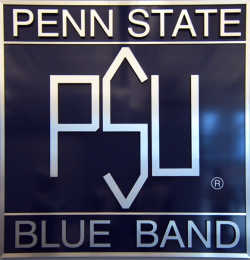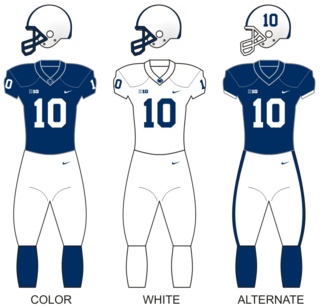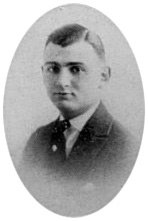Related Research Articles
"On, Wisconsin!" is the fight song of the Wisconsin Badgers at the University of Wisconsin–Madison. A version with modified lyrics is the official state song of Wisconsin.

Beaver Stadium is an outdoor college football stadium on the campus of Pennsylvania State University in Penn State University Park. It has been home to the Penn State Nittany Lions of the Big Ten Conference since 1960, though some parts of the stadium date back to 1909. It was also the site of university commencements until 1984. The stadium, as well as its predecessors, is named after James A. Beaver (1837–1914), a governor of Pennsylvania (1887–91), president of the university's board of trustees, and native of nearby Millerstown. Officially, the stadium is part of the municipality known as College Township, Pennsylvania, although it has a University Park address.

The Pennsylvania State University Marching Blue Band, known generally as the Blue Band, is the marching band of Pennsylvania State University. Founded in 1899, it is the largest recognized student organization at the University Park campus of Penn State, with over 300 active student members. The primary function of the Blue Band is to support the school's football team, performing for all home football games at Beaver Stadium.

The Penn State Nittany Lions team represents the Pennsylvania State University in college football. The Nittany Lions compete in the NCAA Division I Football Bowl Subdivision as a member of the Big Ten Conference, which they joined in 1993 after playing as an Independent from 1892 to 1992.

Formed in 1845, the Holy Cross Goodtime Marching Band is one of the oldest organizations at The College of the Holy Cross in Worcester, Massachusetts, USA, and one of the oldest college bands in the United States. The Crusaders Marching Band first began performing at football games in 1910 and the band's role has expanded significantly since to include other athletic appearances, performing at all home football games, selected away games, in exhibition at high school band competitions, and at various events throughout the country. In the spring, the marching band converts into the Holy Cross Crusader Pep Band and plays at all home basketball games, and travels with the teams to the NCAA tournament. The Marching Band performs at Fitton Field while the Pep Band plays in the Hart Center.
"The Nittany Lion" is a traditional fight song played by the Penn State Blue Band at football games and other sporting events. During the pre-game show of home football games at Beaver Stadium, it is part of the traditional Lion Fanfare and Downfield. While it is not the official fight song of Penn State, it is one of the songs most widely associated with the university, and is also incorrectly referred to as "Hail to the Lion". On Fridays and Saturdays, the clock tower in Penn State's Old Main plays a line of the chorus music at the fifteen-minute mark of each hour, and adds a line every 15 minutes until the whole chorus is played on the completion of the hour.

The "Penn State Alma Mater" is the official alma mater of The Pennsylvania State University. The song was accepted by the university in 1901.
"Fight On, State" is the official fight song of The Pennsylvania State University. It is most widely known for being played by the Penn State Blue Band after scores at football games, and during the band's pregame show. It is written specifically to be played after a touchdown, as it slows down quickly toward the end of the song, then stops. It then resumes after the team kicks an extra point and is played again at regular speed.

The Kansas State University Marching Band, also known as "The Pride of Wildcat Land" or just The Pride, is a 400+ piece marching band consisting of woodwinds, brass, percussion, color guard, dancers, and twirlers. It is the official band of Kansas State University.
The 2004 Penn State Nittany Lions football team represented the Pennsylvania State University in the 2004 NCAA Division I-A football season. The team's head coach was Joe Paterno. It played its home games at Beaver Stadium in University Park, Pennsylvania.
"The Red and Blue" is a popular song of the University of Pennsylvania, a private Ivy League university in Philadelphia.

The Thunder of the East is the marching band of the University at Buffalo in the State University of New York system. UB's first marching band was created in 1920, and disbanded in 1927. It was revived in 1946, increasing in size and reputation until about 1970. It was known as "The Pride of the East." At that time, it was dissolved upon UB's departure from Division I athletics. In 1981, some UB students continued the tradition of playing music at UB's home football and basketball games by forming UB's Pep Band. In anticipation of UB's return to Division I athletics, a marching band was formed in 1999 and named, "Thunder of the East." The band debuted at the University at Buffalo Stadium on September 11, 1999. The Thunder of the East is currently led by James E. Mauck; and performs at UB's Buffalo Bulls home football games, as well as in other musical venues.

"Hail to Pitt" is the most traditional fight song of the University of Pittsburgh, which is commonly referred to as Pitt. The saying "Hail to Pitt!" is also the most traditional and commonly used slogan of the University of Pittsburgh and its athletics teams. The slogan is frequently used in promotional material, printed on merchandise and souvenirs. It was also the title of a 1982 history of Pitt athletics by author Jim O'Brien. The slogan is often used among alumni as a statement of affiliation, including as a closing signature in conversation or correspondence between alumni, and is sometime abbreviated as "HTP" or "H2P", the latter of which is a registered trademark of the university and is frequently used on official university signage and merchandise.

The "Pitt Victory Song", one of the most popular and widely used fight songs of the University of Pittsburgh, is often played in conjunction with "Hail to Pitt" and the "Panther Song". It was originally written by former to students of the university in order to solve the issue of the university not owning the copyright to "Hail to Pitt" which prevented the school from granting permission for its use during football radio broadcasts. Lyrics were written by G. Norman Reis and Louis M. Fushan. Music was written by Benjamin Levant. The song debuted in the Cap and Gown Club's 1938 musical production entitled Pickets, Please! Although commonly performed at university events, few people today know the rarely heard first portion of the song that occurs before the chorus. However, the most common cheer that is used during Pitt-related events and athletic contests is "Let's go Pitt!", which while perhaps derived from the song's lyrics, is often cheered even in absence of the song or music.

The alma mater of the University of Pittsburgh was adopted soon after the University changed its name in 1908 from the Western University of Pennsylvania to its current moniker. Lyrics were written by George M. P. Baird, class of 1909 and were set to the tune of what was then the Austrian National Anthem. A new tune for the "Alma Mater" hymn was composed by Charles W. Scovel, class of 1883, but it was not widely adopted and was either lost or became obscure.
Legion of Blue is the student cheering section supporting the Penn State Nittany Lions men's basketball team. The cheering section has been around as long as the Penn State basketball team, but the organization was formed in 2003 as the Nittwits before changing its name to Nittany Nation in 2007. In 2015, Nittany Nation was rebranded as Legion of Blue in an effort to better organize the group. Legion of Blue was named after the Legion of Boom, the nickname of the mid-2010s Seattle Seahawks defense that was popular during the time of the rebranding. ESPN and the Big Ten Network have featured the section during live game action.

The Penn State Nittany Lions women's soccer team is an intercollegiate varsity sports team at Pennsylvania State University. The team is a member of the Big Ten Conference of the National Collegiate Athletic Association. The Nittany Lions play at Jeffrey Field in State College, Pennsylvania on the campus of Pennsylvania State University.

"Varsity" is a fight song of the University of Michigan.
The White Out is a tradition at the Pennsylvania State University during select Nittany Lions home football games, where all spectators come dressed in white. It has been described as "the best atmosphere in college football." It is also among the most expensive regular season games of college football, with ticket prices ranging upwards of $250. All White Out games are showcased with an advanced fireworks display lining the east and west of Beaver Stadium. During these games, Zombie Nation's Kernkraft 400 is often played after a big play.
The Block Six was a blocked field goal by the Penn State Nittany Lions football against the Ohio State Buckeyes, resulting in a 70-yard return touchdown in the final minutes of a 2016 rivalry game between the two teams in Happy Valley. The play led Penn State to beat Ohio State for the first time in five years, with a final score of 24–21. It is regarded as the best play in Penn State football history, and marked the program's return to national relevance following the Jerry Sandusky scandal.
References
- Range, Thomas E.; Sean Patrick Smith (1999). The Penn State Blue Band: A Century of Pride and Precision. Penn State Press. p. 232. ISBN 0-271-01960-3.